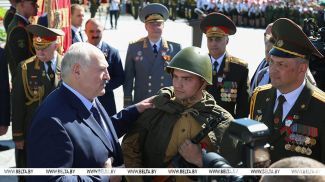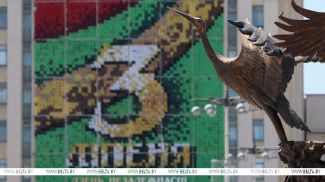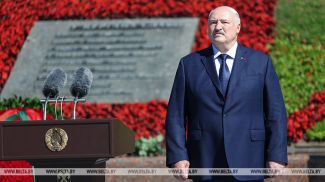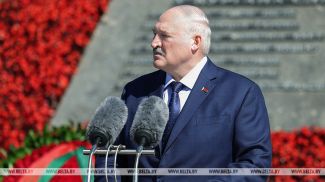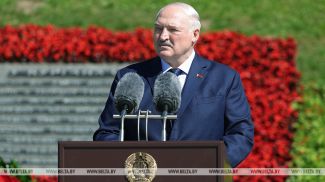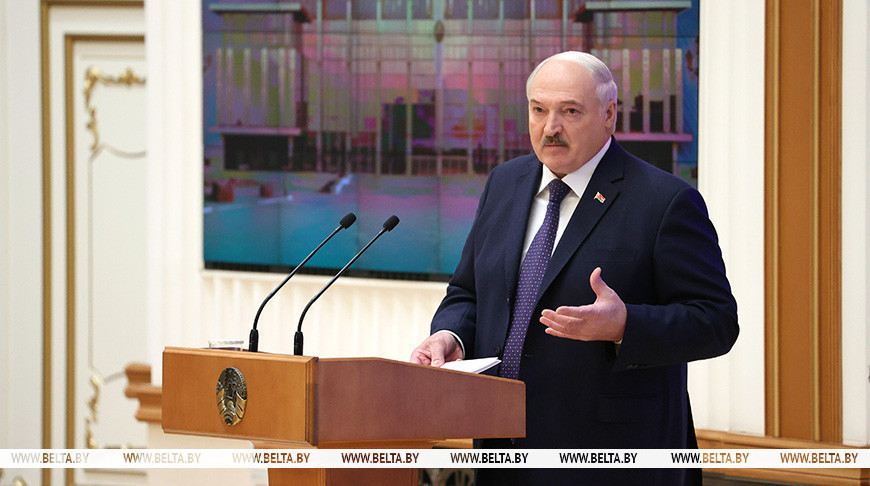
Recently, Aleksandr Lukashenko has said that he forbade the government to complain about sanctions. The logic was simple: if officials fail in their work, they would definitely use sanctions as an excuse. But ordinary Belarusians, the head of state emphasized, do not care whether it is sanctions or not: people just want to live and work. Simultaneously, the government was working very hard on import substitution. This approach, as time has shown, has proved effective. New restrictions that the West imposed on the Belarusian economy were painful but not critical: Belarusians have long learned to work in such environment. Sometimes we hear some people say "Belarus is not up to the task”. But this narrative is mainly promoted by "experts" from abroad, who have a negative attitude towards the state and, moreover, have a poor grasp of the situation in the country. In a new episode of BelTA’s Youtube project “After the Fact: Lukashenko’s Decisions” we will tell you why Aleksandr Lukashenko wants the manufacturing sector on its tiptoes. What do sunflower crops in the president's experimental fields have to do with the import substitution policy? Why did the West fail to bring Belarus and Russia to their knees? What is the basis for the further development of the Eurasian Economic Union, in the opinion of the Belarusian leader?We will also discuss whether our countries can deal with cultural “import substitution".
Import substitution in Belarus. How did it start?
Sometimes it may seem that Belarus has started working on import substitution just recently, when the country was hit by the unprecedented amount of sanctions.But that's not entirely true. Or rather, not true at all. Indeed, in the context of sanctions, the import substitution effort has become more aggressive,but it goes back more than two decades in our country.
At the turn of the 2000s, the country put together a dedicated state program, and the results were not long in coming. During the first five-year period, from 2001 to 2005, Belarus implemented around 300 projects and manufactured import-substituting products worth more than $2 billion. In addition, the country created 2,600 jobs and exported part of the manufactured products, earning almost $1 billion.
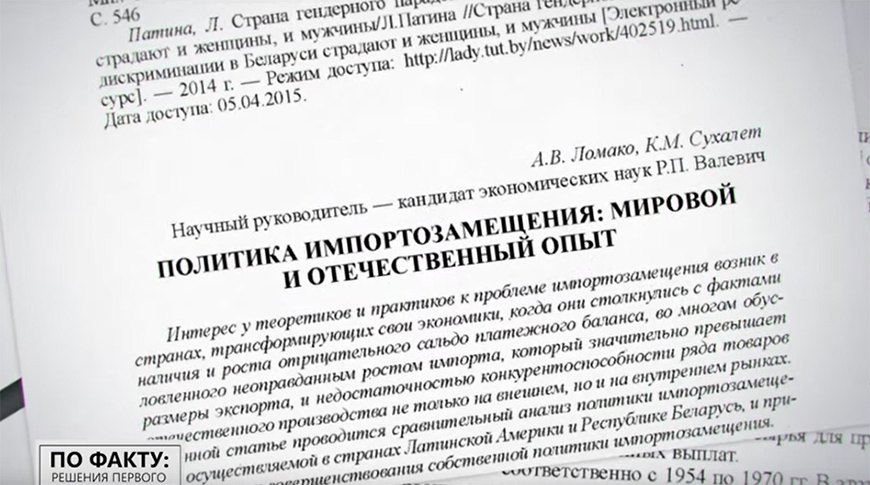
The second five-year period brought even better results. The number of import-substituting projects quadrupled, production exceeded $11 billion, with a third of this output sold internationally. Compare these figures with the data of recent years.
“In 2023, we manufactured import-substituting products worth $30 billion, or up by $6 billion in just three years. The share of import-substituting products in the total volume of industrial output stands at 45%. Half of these products are sold internationally,” said Vladimir Lobanov, Head of the Industrial Economics Directorate at the Economy Ministry.
Why does Lukashenko pay so much attention to import substitution?
It is for a reason that Aleksandr Lukashenko keeps saying that Belarus has no other choice but to be self-reliant, as this is one of the pillars of its sovereignty. That is why all the president’s working trips have something to do with import substitution. Hence the president's demand to maximize the use of the country’s industrial capacities.
During the visit to the motorcycle plant in August 2022, the president started questioning the company chief when the latter decided to showcase one of the company's new launches – a motorcycle. It looked really nice, yet what component parts were used in its production?
- What was your input to this product?
- We did the design, idea, layout. We assembled all components from various manufacturers, said Nikolai Ladutko who was the company chief back then.
- In other words, you did nothing on your own.
- But we assemble small components, this is also work.
- Where did the headlight come from?
- The headlight is from China.
- The fenders?
- The fenders, too.
- The engine?
- The engine is Chinese.
- There is no localization. If sanctions are introduced tomorrow, if production stops, what will you do?
- If production discontinues, we will start making fenders.
- I have heard it all before. Where will you get the mold? Where will you get 30,000 to buy it? How long will it take? We must do things on our own.

By the way, the import substitution effort extends not only to heavy industry. It’s just that this industry gets more attention than others.
“This pertains to everything, including woodworking, light industry, and food industry. The import substitution program involves seven regions and ten ministries and concerns. We also tap into our scientific potential. Every year, scientific organizations of Belarus conclude more than 3,000 business agreements to create import-substituting products for the real sector of the economy,” Vladimir Lobanov said.

A couple of years ago the Belarusian president asked agricultural scientists whether it made sense to plant more sunflower in the country. It was also about import substitution as Belarus has to import sunflower oil. There were different opinions on that. Yet, Aleksandr Lukashenko ordered to plant sunflower on his experimental fields in order to see how it would grow and make a decision based on that.
Ultimate goal of Belarus' import-substitution program
Import substitution is a long-term strategic national project. It largely sets key guidelines for the country’s industrial complex. Thus, a long list of import-substituting products was compiled in Belarus. It features 3,000 products that have significant export potential. Their projected output is estimated at more than $25 billion. Quite a big deal, isn’t it?
Each item on the list went through several stages of rigorous scrutiny. First, specialists studied the demand for a specific product in the domestic market. Then they determined whether the country had the necessary competencies, raw materials, technologies and industrial sites to launch the production of this product. After that a product’s competitiveness was assessed based on the price/quality ratio. Finally, experts analyzed the export potential and benefits for the domestic economy of this product.
Prime Minister Roman Golovchenko has emphasized that import substitution and localization are quite complex and complicated issues, but the government understands where to go. “There are annual plans and programs for import substitution. They are implemented successfully. Of course, this is not enough to achieve complete independence and technological sovereignty,” he noted.
“The overall goal is to increase the localization of production, which implies launching new technological operations. We approach all other issues through this perspective. This applies to all benefits, preferences, state support, and so on. They should be provided only to those who have achieved the required level of localization. And, of course, all this must make economic sense,” the head of government emphasized.
Can technological sovereignty be achieved?
Import-substitution and technological sovereignty are coming to play an increasingly important role.
Economic analyst, PhD in Economics Georgy Grits noted that Belarus has been pursuing an import-substitution policy for several years already. Yet, approaches and principles have changed in recent years.

“Why do we have to import something from another country, from another region, from another continent when we can make it here and provide jobs to our people? We have cheap labor and cheap energy resources. We do have a competitive advantage. And then why don’t we tap into the markets that are held by our competitors. But in the last couple of years import substitution moved from a simple business project to a national security matter. By introducing sanctions and blocking supplies, the West tried to strangle us, to deprive us of our national identity and sovereignty. Therefore, the import substitution effort has become more relevant today. It has become a matter of security. This is the priority,” the expert said.
True, it is impossible to achieve technological sovereignty in all industries, because this would cost trillions of dollars. For context, Belarus' GDP last year was estimated at about $70 billion.
Therefore, it is very important to team up with other countries. And, of course, our main partner is the Russian Federation. Belarus-Russia cooperation has yielded visible results not only in traditional industries.
“Closer cooperation in import substitution is the main task for the manufacturing sector. A lot has already been done in this regard. We have realized much of what we did not understand two years ago. They failed to bring us to our knees. On the contrary, we braced ourselves and achieved a lot,” Aleksandr Lukashenko said at the Union State Supreme State Council summit on 29 January 2024.
Import-substituting projects of Belarus and Russia
Today, Russia is ready to allocate additional funds to Belarus for joint projects in import substitution. The credit line for RUB105 billion, opened at the end of 2022, has already been distributed among large-scale investment projects.
Import-substituting projects of Belarus and Russia
Today, Russia is ready to allocate additional funds to Belarus for joint projects in import substitution. The credit line for RUB105 billion, opened at the end of 2022, has already been distributed among large-scale investment projects.
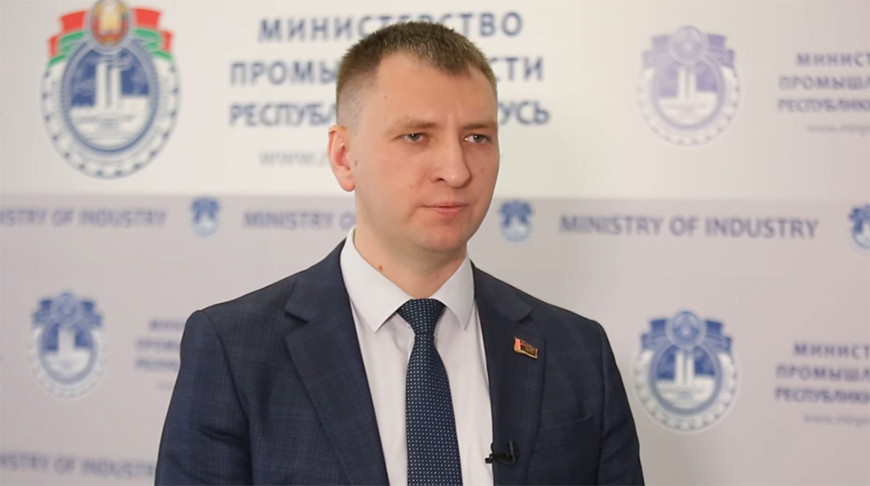
“The Belarusian Industry Ministry and the Ministry of Industry and Trade of the Russian Federation have agreed on 25 promising import-substituting integration projects. Total investments exceed RUB140 billion. Twenty projects are currently in full swing. More than 1,600 units of technological equipment are to be purchased for them. About 30% of this equipment has already been delivered to our enterprises and will come on stream soon. The first batches of products under these projects have already been produced and delivered to consumers in the Russian Federation. We supply Russia with electronic components, components for conveyor enterprises, axles, gearboxes,” Deputy Industry Minister Aleksandr Yefimov said.
On a bigger scale, industrial cooperation in the EAEU will make it possible to create products under the Eurasian brand with the maximum degree of localization, and also help develop new import-substitution projects. There is room for growth.
“A quarter of the industrial goods imported into the Eurasian Economic Union (about $70 billion a year) can be replaced by domestically-made products. This is a huge share. I hope to God we can handle it. The fourth industrial revolution will make it possible to implement import-substituting initiatives in the real sector of the economy at the regional level. Technological sovereignty and replacement of critical imports will remain the foundation for the development of our union regardless of how our relations with so-called Western partners are going forward,” the Belarusian president believes.
How outer space and peaceful atom ensure technological sovereignty
The notion of “technological sovereignty” has recently acquired a slightly different meaning. Belarus has always looked into the future. Let us take the country’s latest breakthrough - the flight of the first Belarusian cosmonaut into space. Ignorant people would say: “They just placed her into a spacecraft and sent her to the ISS. What’s the big deal?” Belarus started building its competences in the space sector back in the Soviet times. Belarusian scientists and engineers designed equipment for the space industry of the entire Soviet Union. Today they continue their work and do it at the highest level. Therefore, Marina Vasilevskaya's participation in the ISS expedition made perfect sense.
The Belarusian nuclear power plant is another example. The construction of the plant enabled the country not only to replace several billion cubic meters of natural gas but also paved the way for new hi-tech industries.
Why does Lukashenko call for cultural “import substitution”?
What about cultural “import substitution”? Here we are not talking about banning everything foreign. We are talking about promotion of national culture. How can we encourage our citizens to go local. The question, of course, is rather philosophical. But it is better not to put it off.
“We have always cherished our culture and folk arts. Time brings new challenges though. It is not enough to preserve and revive. The need for gradual cultural “import substitution” has become relevant. I will say it straightforwardly: it is time to move away from cultural trends and celebrations that contradict our Christian traditions and morals,” the president believes.
The president made the statement as he delivered his annual Address to the Belarusian people and the National Assembly, stressing the need to be proactive in promoting our own traditions, our own symbols, our own artists, painters and so on. All the more so as the demand for domestic, local products is on the rise.
Import substitution takes skill and patience. Yes, everything sounds beautiful in words and the figures seem to confirm it. Belarus, however, is clear-eyed about the future. Aleksandr Lukashenko emphasizes that import substitution means not only an opportunity but also hard work. It is both difficult and time-consuming. But we have to hold out and prevail.
At the meeting to discuss the country’s manufacturing sector on 9 April, the head of state noted that Belarus was able to produce good machinery, but localization was sometimes lagging behind.
“Every critical position shows our weaknesses. It is where our competitors hit us with sanctions. We need to take measures to ensure maximum technological independence and create conditions for the sustainable operation of the economy that is sanction-proof. This is a strategic task for our industrial complex. We need to build a reliable shield against any external factors and this is another task for everyone. This is why import substitution is vitally important and must be ongoing. Today, it's a priority of priorities,” the president said.





